You went to a trusted breeder and picked out the perfect puppy, but somehow, as they got older, they don’t quite look as you thought they would – what happened?
Guessing a dog’s genetic background is no easy task. Even experts are often perplexed with the discrepancies between a dog’s appearance and the breeds in the mix.
The truth is canine genes are unpredictable things, and just because you got a second or third-generation Doodle doesn’t necessarily mean they will have the much-loved curly, teddy bear-like Poodle coat.
However, it might also be the case that the breeder is pulling the wool (or wool coat) over your eyes. When you’ve shelled out all that cash for the dog of your dreams, what do you do when you start to suspect that you haven’t got what you paid for?
Dog DNA tests might be the answer. Here we will take a look at what they are, what they do, consider how accurate they are, and review some of the best ones currently on the market.
What is a Dog DNA Test?
Dog DNA tests are a relatively new idea that is riding high on the wave of the recent popularity of people DNA testing. Given that these days it’s a fairly inexpensive process, an increasing number of pet owners are turning to these tests to find out more about their best friends.
Both concepts make use of cell analysis for exploring ancestry and genetic inheritance. In the same way that your DNA test can tell you more about your family tree, a canine DNA test can tell you more about the breeds that make up your adorable, quirky mixed or designer pup.
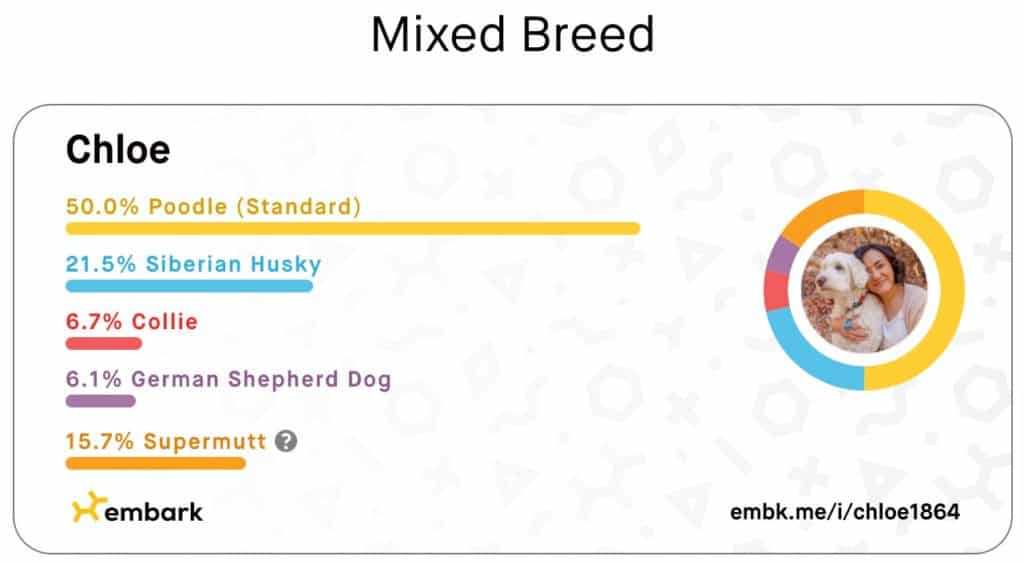
Other genetic tests have been specifically designed to also scan for the presence of any genetic markers that may indicate possible future health problems. The idea is that they can predict your dog’s risk of developing certain conditions based on variants found in the DNA using information from an extensive database of doggy DNA.
Why Test Your Dog’s DNA?
People choose to purchase a Dog DNA testing kit for a variety of reasons, including:
To Know Their Breed
Many individuals opt to do it for the same reason that they might test their own DNA – sheer curiosity.
If you purchased your pup from a breeder, then chances are you know what you have (although you might not always be entirely sure…). However, if you picked up your ‘Heinz 57’ dog from the pound, it can be fun to play the trait guessing game – “he’s got the face of a Pit Bull,” “she’s got the shape of a Greyhound”….
DNA tests offer owners a great way to confirm what they think they already know about their pet. They also help you to accurately answer the question every pet parent is regularly faced with – especially when they have a unique-looking or particularly adorable pooch – “what breed is your dog?”
To Better Understand Their Likes and Needs
Knowing more about your dog’s background is no doubt advantageous in helping you to understand why they sometimes act the way they do.
Their chatty nature could be due to Husky heritage. Their love of water could be because of a Labrador grandparent. Their constant desire to chase small animals could be driven by a Terrier background.
Having such information is not just interesting; it could also prove to be a real help when you are working out your pup’s exercise or nutritional needs. And, if your baby is still a baby, it allows you to be prepared for what they will be like as an adult. It could also prove vital during the training process to know more about your puppy’s temperament, which is usually heavily dependent on their breed.
To Check Their Health Status
Having an understanding of your pet’s genetic history can also better equip you for supporting their health and wellbeing.
Many canine conditions, such as joint, eye, or breathing problems are breed-based. So, knowing more about where your dog comes from can highlight the diseases that they are particularly prone to.
Moreover, these tests look for specific genetic markers that can predict the development of certain conditions. This allows you to take preventative measures (based on your vet’s advice, naturally). This might be as simple as switching up their diet to include more of a specific kind of nutrient or taking them for more regular health screenings.
How Accurate are Dog DNA tests?
The accuracy of Dog DNA tests is tricky to determine as there is no independent regulatory board as there is with human DNA testing. Such agencies examine the validity of the data produced, which helps to ensure its accuracy. So, accuracy ratings may seem quite high (up in the 90s), but we need to keep in mind that these are self-reported results from the companies creating and selling the kits.
A further issue with evaluating these tests is to do with the fact that the science can be tricky to understand and, even if that wasn’t the case, each company keeps their methods firmly under their hats citing proprietary concerns (they are worried someone will steal them).
It would be good to have a little more transparency on the testing methods and the science behind it and improved standardization on the way that findings are presented. However, In the absence of this, we are left with user reviews and advice from professionals – which we have utilised to the best of our abilities here.
The problem with genetic testing in dogs is that it is a fairly recent concept. A 2005 study looking at the canine genome began this idea of using genes to identify heritage and specific traits – including diseases. This research effectively kickstarted the whole doggy DNA trend we are seeing today.
So, while this kind of testing is a really powerful tool, it’s very much still in its infancy. Not only does this mean that scientists are still getting to grips with it, but it also means that data pools are still relatively small. There just isn’t as much information out there about doggy DNA as there is about human DNA.
On the other hand, the general consensus seems to be these tests can be pretty spot on when it comes to predicting breed – especially the higher-end ones. If you search the net, you can find plenty of examples of independent websites that have tested the top ones by sending samples of the same dog off. It’s just the health screenings that owners perhaps need to be a little more cautious about.
Our Top DNA Test Kit: Reviews
In selecting our top choices, we looked at a whole host of factors. Everything from methods to research to turnaround times and reviews went into the mix. In this way, we narrowed down the selection to the four best (in our opinion) contenders.
Embark Breed & Health Dog DNA Test Kit
Developed by veterinarians in partnership with Cornell University, the Embark Breed & Ancestry Identification, Trait & Health Detection Dog DNA Test Kit is one of the highest-rated dog DNA tests on the market today and our top pick for good reason. It compares your canine’s sample with 200,000 genetic markers across more than 350 dog breeds, including even wolf, coyote, and village dog ancestry, for extremely accurate results (95% to 99% as reported by the company) down to 5% of your pup’s breed mix.
Embark Breed and Health Kit (DNA Test)
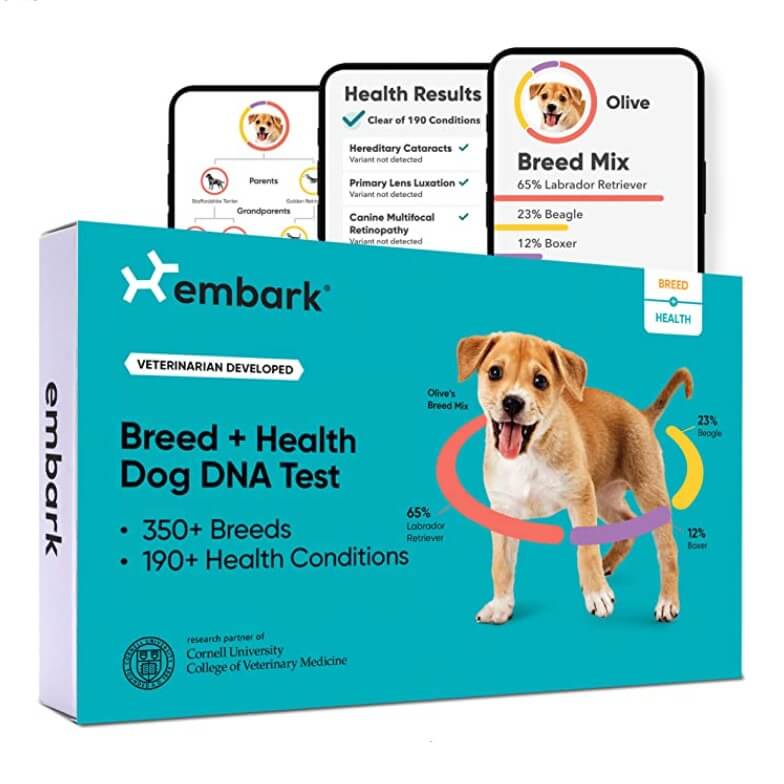
The test can give you a clear breakdown of your dog’s breed composition and view their family tree right back to their great grandparents. You can also test your dog for 200+ genetic health risks, such as glaucoma, MDR1 drug sensitivity, degenerative myelopathy, and common adult-onset diseases, with a report that can be shared with your veterinarian. Finally, you can find and connect with other dogs that share similar DNA using Embark’s unique Canine Relative Finder.
While this test is the most expensive on our list, it is also the most comprehensive. Cornell University College of Veterinary Medicine is considered to be one of the leading veterinary schools in the country and pioneers in the field of consumer genetics. Plus, reviewers really love this product. A whopping 93% of them would recommend this product to a friend*. So, if you’re looking for thorough details and are willing to shell out a little more, then this is the one to get.
*Accurate at time of publishing.
Wisdom Panel Premium Dog DNA Test
Similar to Embark’s DNA test, the Wisdom Panel Premium Dog DNA Test screens for more than 350 dog breed types and 200+ health tests, and that’s why it’s our second choice. The company boasts a staggering 1% breed reporting precision compared with Embark’s 5% – although both sound pretty good to us! However, the company also claims a slightly lower 93% accuracy rate. This is largely to do with fewer genetic markers being compared in the testing (‘just’ 100,000) and probably accounts for the lower price tag.
Wisdom Panel Premium Breed & Health Condition Identification DNA Test

The test also provides information about ancestry – as far back as the great grandparents, as well as details on medical complication risks, potential adverse reactions to medications, and genetic dispositions for various traits – including health-related ones. In this respect, they seem to go a little further than Embark, and with a database of more than 1.7 million dog samples, the results are going to be pretty precise, and you’ll get them a little quicker, too.
Another great feature of the Wisdom Panel test is that those with young dogs can also access information on their ideal adult weight range and the kinds of physical traits they are likely to possess when they are a little older.
In terms of user feedback, this kit seems very much on par with Embark. Many pet parents confirm the accuracy of the test and comment that they are delighted with the results, and the customer service seems to be pretty stellar, too.
Two other options are the Orivet Mixed-Breed Identification & Life Plan Dog DNA Test Kit and the DNA My Dog Breed Identification Test Kit. These both have rather more mixed reviews, though.
Orivet Mixed-Breed Identification & Life Plan Dog DNA Test Kit
Orivet’s test is around the same price as Wisdom Panel’s. Similarly, it provides a three-generation ancestry report using details from more than 350 different breeds. They also screen your pup’s DNA for more than 200 diseases and traits based on their breed combination. The bonus with this kit is that the results include a personalized Life Plan to help you manage your dog’s health and wellbeing throughout their life.
Orivet Mixed-Breed Identification & Life Plan Dog DNA Test Kit
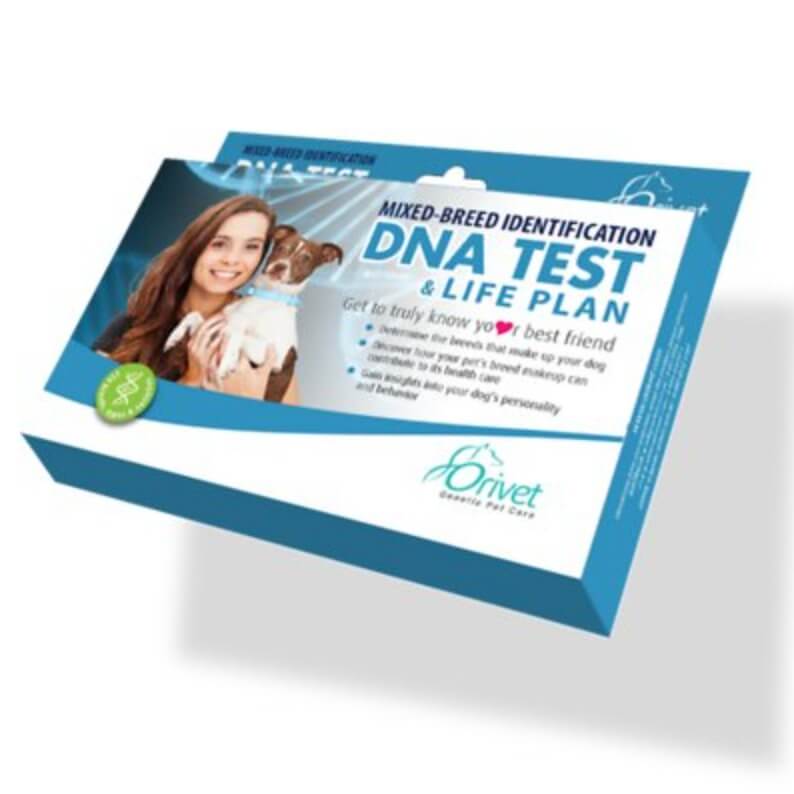
Issues seem to be centered around wait times, customer service, and a tricky-to-navigate site. However, some customers do comment that the results were easy to read and seemed to be pretty accurate. The website, however, is more geared towards pedigree tests for breeders and genetic screening for veterinarians rather than aimed at providing more simple-to-understand tests for the general public, which is a little confusing.
DNA My Dog Breed Identification Test Kit
DNA My Dogs’ test is frequently touted on review websites as the budget choice because it is much cheaper than any of the others. The fact that it’s included means it does have some merit, but reviews are 50/50. Common complaints also include long wait times, but many product users also believed the results to be inaccurate. As covered above, this could be to do with the weird way that canine genes are sometimes expressed, or not…
DNA My Dog Breed Identification Test Kit
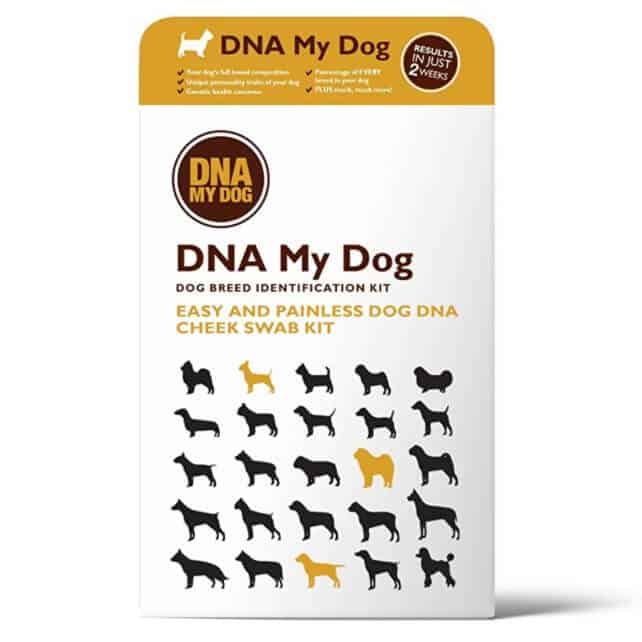
Other reviewers, though, were very positive. They talk about the kit as not only being the cheapest but the quickest too. They also mention that the test was simple to do, and the results were comprehensive, clear, and easy to understand.
The company’s website is undoubtedly straightforward to navigate. The ‘budget’ side of things is likely to be due to the fact that fewer breeds are included in their database, and the health screening seems to be much less thorough than Embark’s, Wisdom Panel’s, or even Orivet’s.
How Do Dog DNA Tests Work?
Probably one of the best things about doggy DNA tests is that they are practically effortless to conduct on the part of the owner. In most cases, all you need to do is register your dog online, use a swab to collect a saliva sample from the inside of their cheek, pack it up and mail it off to the company.
Once they receive it, the hard work really begins. A computer matches the genetic markers present in your pup’s sample against those of various different breeds. In the case of the more comprehensive tests this will run to the hundreds. It will then select the most likely combination from literally billions of possibilities.
After a few weeks you will receive the results by email with your dog’s breed composition broken down into percentages if they are mixed heritage. This makes it super easy to understand their ancestry in a clear and precise way.
In terms of health testing, you can learn a lot about your pup’s potential problem areas based on their breed. However, these tests also consider genetic markers linked with certain common canine heritable diseases.
Keep in mind, though, that just because a dog has that marker doesn’t necessarily mean they will go on to develop the condition. Most depend on a complicated interplay of genes and environment to occur. These test results simply allow you to be more aware and take preventative measures based on veterinarian advice.
Are There Any Reasons Not to Test My Dog’s DNA?
There are no specific health issues linked with testing your pet’s DNA. As you can see from above, it is a relatively straightforward and non-invasive process. However, you need to consider your own motivations for doing the test – what will the results mean to you?
If it’s mere curiosity or done out of concern for your pet’s health, then that is one thing, but if you want to ensure you have the breed you wanted, what will you do if you discover that’s not the case?
A sad reality, though, is that some owners have abandoned their dogs or, worse, had them put down, based on findings from either the ancestry or health tests. This happened because they were either not the breed they wanted or because they believed them at risk of developing possibly painful or costly conditions.
The risk is that owners are basing life-or-death decisions on what is essentially incomplete information. This may not be the best approach for making heavier, graver decisions. As with any medical decision, consult your vet. Take the results of the test in with you and see what they have to say about it.
What Are the Larger Benefits of Dog DNA Testing?
Probably one of the best things to come out of DNA testing is that some breeders are using the information they receive to begin to eradicate some hereditary canine conditions from the gene pool through selectively breeding healthy dogs. In this respect, genetic testing has fantastic potential to improve the overall health of dogs.
It also serves to make owners more aware of potential future health problems of their pets from the very beginning. The advantage of this is that many pet diseases are highly preventable with the use of a personalized lifestyle and wellness program that encompasses such things as diet and exercise.
Dog DNA Testing: Frequently Asked Questions
Can you register a dog with a DNA test?
The American Kennel Club says of their own DNA test (not reviewed here because it is only for purebreds):
“DNA Profiling is for parentage verification and genetic identity purposes only and does not take the place of AKC registration requirements.”
This means it is pretty unlikely that you would be able to register your dog from the results of a third-party test even if they do turn out to be somewhat more of a Poodle Dood (for instance) than an actual Doodle.
Can you get DNA from dog poop?
You can’t get DNA from the poop with the tests included here – these all make use of cells found in saliva. However, there are companies out there that do provide such a service. PooPrints by BioPet Laboratories is one. Their mission is to increase responsible pet ownership and decrease the environmental impact of dog waste – a worthy goal indeed!
Do all dogs have the same DNA?
Deoxyribonucleic acid, otherwise known as DNA, is pretty awesome. Inherited from parent animals, it contains all the information needed for life to occur. All living things have it. While animals of a similar species have similar DNA, each organism’s DNA is utterly unique. So every dog is truly one of a kind.
Can Dog DNA tell age?
While, in theory, dog DNA can provide an accurate estimate of their age at a genetic level through measuring the length of their telomeres (repetitive nucleotide sequences) to determine their age at a genetic level, not every kit will offer this as part of the package. It’s best to ask the manufacturer before you buy.
Do vets do dog DNA tests?
Veterinarians do not have a great deal of experience with canine genetics as it is a relatively new field of study. Therefore, it’s doubtful that your local vet would offer a DNA testing service. However, more advanced DNA tests (not the ones included in our list) require a blood sample which is something your vet would be able to help you with.
Dog DNA testing can be an excellent way of learning more about your precious pet so that you can understand them better and take better take care of them. However, experts caution people from making snap judgments about their pet’s health using just the results from such tests.
If you’re looking to determine whether your Doodle is, in fact, a Doodle – and that they have been mixed with the right breed, they can be particularly useful. Hopefully, though, you are able to get the results before you buy or, if not, that upon finding out you haven’t got quite what you wanted, you love your bud enough for it to not matter an ounce that they are a little different than you had anticipated.
Have you done a DNA test on your dog? What were the results and did they match your expectations?
Learn How to Care for Your Doodle Puppy!

Perfect for first-time Doodle parents, get ALL your questions answered, including questions new Doodle parents don’t even think to ask.
Plus, get $700 worth of Bonus Materials for FREE, including:- Doodle Parenthood Community and Support Group ($190 value)
- Doodle Puppy Growth Tracker ($20 value)
- EMERGENCY Cheatsheet: When To Call The Vet Immediately ($50 value)
- HELP! Button ($145 value)
- And SO MUCH MORE!
The information on this page is for informational purposes only. It is not intended to be a substitute for qualified professional veterinary advice, diagnosis, or treatment. Always seek the advice of your veterinarian or other qualified animal health provider with any questions you may have.

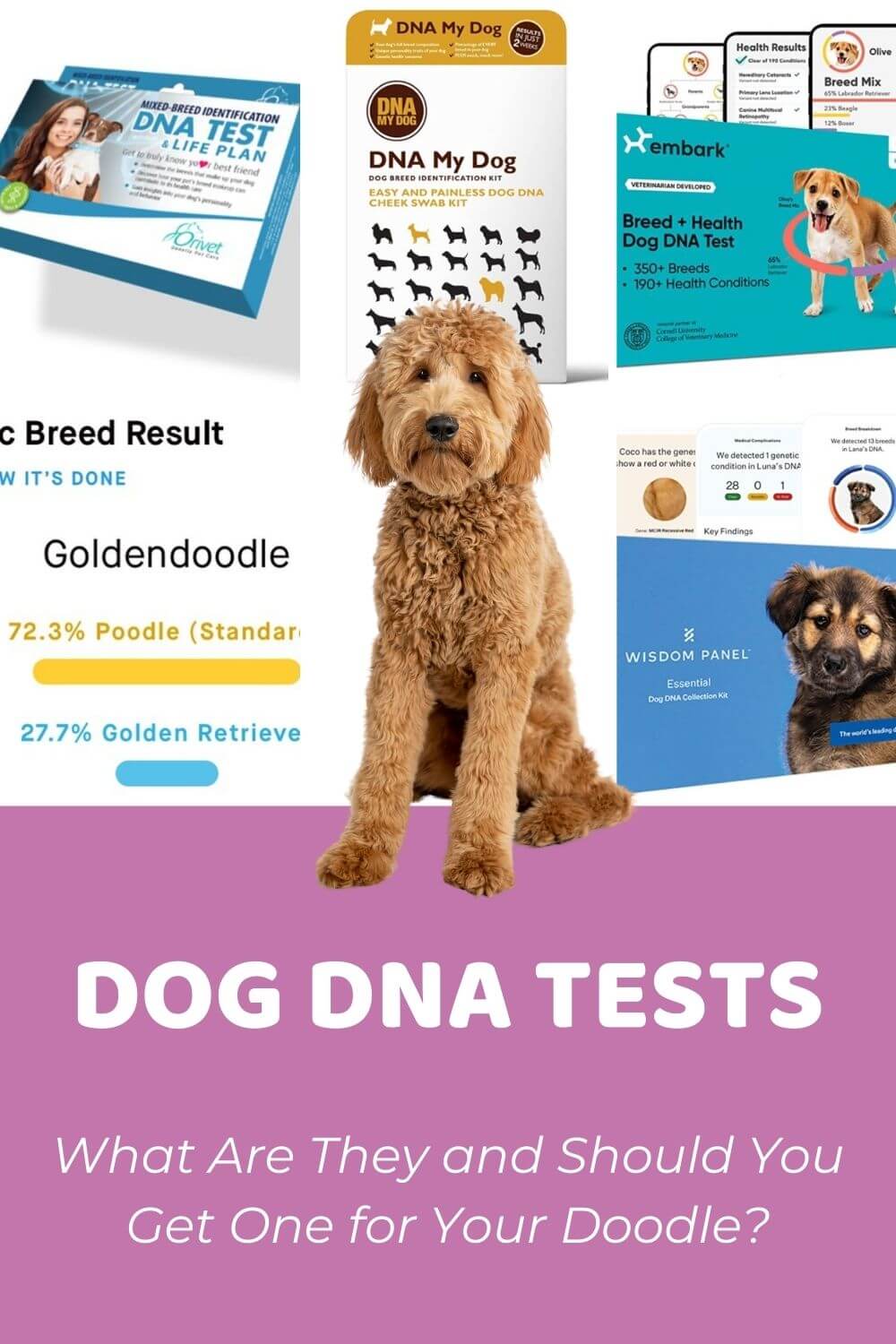



![Best Dog Beds for Goldendoodles (& All Other Doodles) [Updated 2020]](https://doodledoods.com/wp-content/uploads/2021/01/Best-Dog-Beds-for-Goldendoodles-All-Other-Doodles-Updated-2020.jpg)





I think you should call her a “Chloe Doodle”.
June 11, 2023 at 10:55 amAlso, she’s gorgeous.